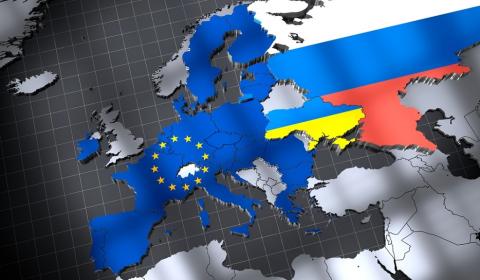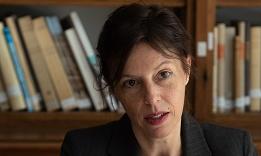
How the EU is Facing the War in Ukraine
An interview with Isabelle Davion, lecturer at the Faculty of Arts and Humanities in Contemporary History of Germanic Countries and Central Eastern Europe, and researcher associated with the Historical Service of Defense.

After Russia's invasion of Ukraine, the European Union is taking a new geopolitical and military turn. Isabelle Davion, a specialist in contemporary European history, breaks down the issues raised by the war in Ukraine for the twenty seven members of the EU.
Can you provide an overview of the origins and the issues at stake in the conflict in Ukraine?
Isabelle Davion: What is at stake is the existence of a Ukrainian nation, which is currently being denied by the Russian authorities. Following the collapse of the Soviet Union in 1991, Ukraine proclaimed its independence, with massive support from its eastern regions. It then signed the Commonwealth of Independent States (CIS) treaty with the new Russian Federation, which sought to arrange a kind of amicable divorce between Moscow and Ukraine. In the wake of this, a number of agreements were developed, including the handover of nuclear weapons on Ukrainian territory to Russia.
In the decade following the end of the Cold War, Russia did not have the means to oppose the international system that had been established in Europe. So it resigned itself to Ukrainian independence and tried to establish neighbourly relationship with it. But in the end, it never accepted the new European security structure and the freedom of member states, affirmed in 1990 in the Charter of Paris for a New Europe, in which each state had to ensure its own security.
According to Russian discourse, with the dissolution of the Warsaw Pact, the Atlantic Alliance no longer had any reason to exist. However, the Atlantic Alliance was maintained, and announced its expansion into Eastern Europe. For Russia, there was one red line that should not be crossed: the integration of the former Soviet republics: Georgia, the Baltic States and Ukraine. With the accession of the Baltic States to NATO in 2004, the issue of Ukraine was reinforced.
Adding to this is the central issue of enlargement of the European Union, which brings a model of liberal democracy to Russia's borders, something that Vladimir Putin rejects.
At the Versailles summit on February 10 and 11 2022, the President of the European Council assured that Ukraine was "part of the European family." What do you think this phrasing means?
I. D.: It is diplomatically delicate phrasing to express that the integration of Ukraine into the European Union is not topical. It is also a way of anchoring Ukraine to the West by considering Ukraine as a European country and not as part of a European-Asian Russian empire. Finally, it is a way of announcing the growing closeness between Ukraine and the European Union through a certain number of common programs - perhaps, for example, participation in Erasmus? - without going as far as integration.
What would be the risks of Ukraine joining the European Union?
I. D.: Since the annexation of Crimea and the operations in Eastern Ukraine, the Kremlin's discourse has always been to present the expansion of the European Union and NATO as aggression against Russia. Therefore, the integration of Ukraine into the EU would be, for the Russian authorities, a provocation and could be considered as an act of war.
How does the war in Ukraine challenge the EU's defense policy?
I. D.: The DNA of European construction is to be at the service of peace, or at least to block the mechanisms that can lead to war. The European Union was initially built on a common market project, i.e. a free trade zone with common policies, without touching on security and defense issues.
However, since its inception, it is clear that crises have catalyzed the construction of Europe. This was the case with the Treaty of Rome, whose signature was accelerated by the Suez crisis, during which the Soviets were already threatening to use nuclear weapons. This was also the case in 1992 with the Maastricht Treaty, which dealt with instruments of sovereignty: currency, but also security and defence. This new stage of European construction did not come about by chance, but at the end of the Cold War with the idea of enclosing the new reunified Germany in a network of international responsibilities.
Over the years, the security and defense programs launched by the EU had more of an objective to challenge the United States on European interests rather than to build a veritable European defense system. The historical turning point that we have seen since the conflict in Ukraine is the will of the 27 member states to construct, in an autonomous way, a European defense identity.
And in particular the defense policy of Germany?
I. D.: As an extension of Germany's responsibility in the Second World War, it was understood that the German army recreated in 1954 should be limited to being a defense army: an army that was too powerful would have been considered a threat to democracy at the time.
Today, Germany is reversing this proposal, claiming that as a member of NATO and a world economic power, it has a responsibility to have a strong army in the service of democracy. The recent 2% increase in military spending by German authorities is therefore intended to create an army capable of opposing conflicts and negotiating from a position of strength. It also gives Germany a greater voice on the international stage to advance this European defense identity.
What is the impact of the United Kingdom's departure, after Brexit, in this war in Europe?
I. D.: The United Kingdom has always been reluctant to set up an autonomous European defense out of loyalty to the United States. The latter preferred that the responsibility for the security of the European continent should lie with the Atlantic Alliance. From this point of view, in my opinion, the departure of the United Kingdom - which is still a disaster in the eyes of history - has made it possible to break a major lock within the European Union.
Has Vladimir Putin not, in spite of himself, succeeded in provoking the awakening of Europe and strengthening the unity between its members?
He has consolidated the unity of destiny. With the conflict in Ukraine, the idea that there could no longer be a war against the countries of the European Union has become obsolete. It is now clear that the defense of peace is not only a matter of spreading a model of liberal democracy, but also of being able to defend this model autonomously against aggression. What is new in the initiatives that have been taken by the 27 EU states is the creation of an autonomous defense tool in relation to NATO, and the unanimity to support its primary initiatives.
Furthermore, there is currently unity on the policy of sanctions against Russia, because this is the best card to play from the point of view of the Europeans in order to get help from the United States. If, at the diplomatic and economic level, this unity were to crumble, the Americans would risk leaving the Europeans alone with their old quarrels, because they do not want to have to deal with internal dissensions in the EU.
Finally, what has strengthened European unity in recent weeks is the fact that the EU countries to the east of Germany are now seen as pivotal to the organization. Until now, they were seen as new members with less weight than major powers such as Germany or France. With the conflict in Ukraine, the discourse of these Central and Eastern European countries has gained legitimacy because of their strategic situation but also because of their expertise in conflicts with Russia. I think that this new situation will allow us to blur the image of a two-speed Europe with, on the one hand, self-proclaimed great powers and, on the other, states that typically have to go along with whatever has been decided.
Nevertheless, the unity that is currently observed among the 27 states remains fragile, does it not?
I. D.: Of course. This unity, which I believe to be sincere, has its weaknesses. And from this point of view, the question of an accelerated integration of Ukraine could cause it to explode. Fault lines are also appearing with regard to the question of the post-sanction period. While all 27 EU member states agree on the need to reduce energy dependence on Russia in order not to finance Putin's war, not all agree on moving at the same pace. This requires the implementation of energy policy programs that may be more or less acceptable depending on the situation of the various European countries. At the Versailles summit on March 10 and 11 2022, the implementation of the reduction of energy dependence was postponed due to the lack of a unanimous position.
You are a contributor to the Digital Encyclopedia of European History (EHNE), a number of articles of which resonate with current events. Can you tell us more about them?
I. D.: In the "Wars, traces, memories" section of the Encyclopedia, there are several articles that enable us to better understand the military history of Russia and Central Eastern Europe, as well as their memorial issues. These are important elements for understanding what is happening today. Moreover, the article on the way in which a war is stopped, in which I distinguish between armistices, capitulations and cease-fires, can help, it seems to me at least, to better think about the stakes of the cease-fire called by the Ukrainians, but also the perverse effects that the cessation of fighting can sometimes have on the prolongation of the state of war.
Photo credits : Marc Chaumeil divergence-images
